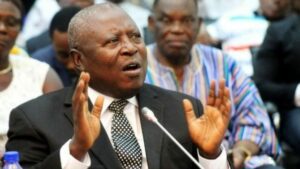A former Deputy Attorney- General of the erstwhile Jerry John Rawlings administration, Martin Alamisi BK Amidu has reminded the Vice President, Dr Mahamudu Bawumia of the initiatives that have resulted in the level of digitalization in Ghana currently, that he (Dr Bawumia), seem to be laying claim to.
According to the former Attorney-General under the Mills-Mahama administration, if there is any regime that should be applauded for the current state of digitalization in Ghana, it is the Provisional National Defence Council (PNDC) and the Rawlings-Arkaah-Mills regimes.

Mr Amidu said this in an opinion piece published on 3News.com in reaction to the Vision Statement delivered by Dr Bawumia on February 7.
Bawumia’s vision speech is a copycat mimicking of the unfulfilled rhetorical vision of Akufo-Addo
“The population of Ghanaians registered for the Ghana Card according to Bawumia’s own analysis shows the challenges of achieving his vision. In any case, the government which had the prescience to licence and encourage Mobitel (now Airtel/Tigo) and Scancom (now MTN) ought to be taking credit for today’s digitization and not the Akufo-Addo/Bawumia regimes,” he wrote.
It would be recalled that while delivering his Vision Statement as the flagbearer of the New Patriotic Party in the December 7 election at the University for Professional Studies (UPSA) on February 7, Dr Bawumia touted his contribution to digitalization in the country.
“We were elected into office in December 2016 to solve many of the systemic problems and challenges that our citizens were facing and which we had highlighted in our manifesto (e.g.no unique identity, no property address system, fake birth
certificates, etc). We had lived with many of these problems since independence.
For me, to lead is to solve. Indeed, all my adult life, my biggest motivation is about finding solutions; solutions that improve lives; solutions that make public services efficient and accessible; solutions that make society progress; solutions that protect the public purse; solutions that make our businesses competitive. I derive my greatest satisfaction from solving problems and I have done so whenever I am given the
opportunity and will do more if I am given the mandate to do so.
I had long held the view that many of these problems facing the economy could be resolved through digitalization. In fact, in my 2010 book on Monetary Policy and Financial Sector Reform in Africa, I proposed digitalization amongst others as the way
forward for African countries.
So, when we assumed office in 2017, as Vice-President, I made the decision, with the blessings and support of the President, to focus on the critical but underdeveloped systems that would expand the economy, improve systems, and create jobs through digitalization. Therefore, as the Minister for Finance oversees the budget (fiscal policy) and the Governor of the central bank also focused on monetary and exchange rate
policy, I focused on the complementary data and systems improvement that would ensure the ease of doing business and change the fundamentals of the economy, making it more dynamic and responsive to modern trends, and the
management of it more scientific and efficient,” he said.
However, the former Minister for the Interior under the Mills regime contended that, “Well-kept archival records in Ghana will show the letters from the Public Agreements Board that facilitated the establishment of Mobitel and Scancom when I was the Chairman of the Public Agreements Board under the PNDC regime and how these developed under the NDC 1 and 2 regimes with the roles Captain Tsikata, and Alhaji Mumuni Bawumia, the two term NDC Chairman of the Council of State, played in actualizing what are the telecom networks in Ghana today,” Mr. Amidu explained.


